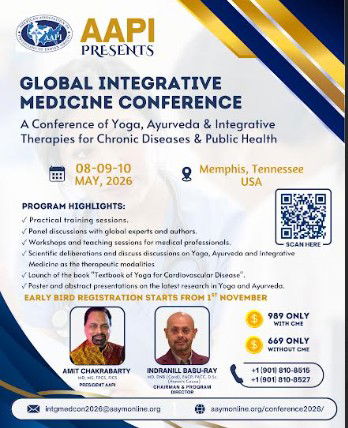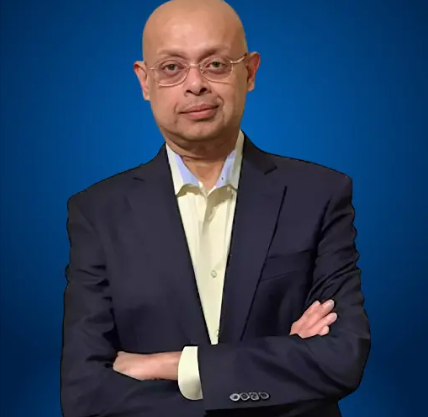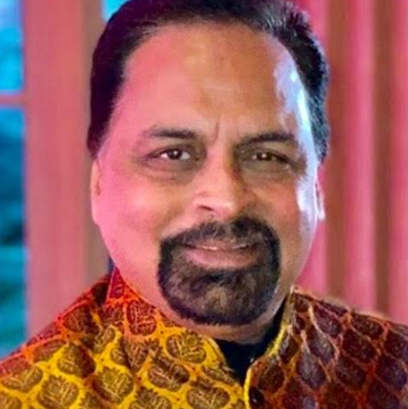America
AAPI, American Academy of Yoga and Medicine, and India’s Ministry of AYUSH to Host Groundbreaking Conference on Integrative Health in Memphis, TN

Global Experts Convene to Advance Yoga, Ayurveda, and Integrative Therapies in the Fight Against Chronic Diseases
The American Association of Physicians of Indian Origin (AAPI), in partnership with the American Academy of Yoga and Medicine (AAYM) and India’s Ministry of AYUSH, has announced the inaugural American Conference on Yoga, Ayurveda, and Integrative Therapies for Chronic Diseases and Public Health.
Scheduled for May 8-10, 2026, in Memphis, Tennessee, this historic event will bring together leading clinicians, researchers, educators, and policymakers to explore the transformative role of traditional sciences and integrative medicine in tackling some of the world’s most pressing health challenges.
Dr. Amit Chakrabarty, President of AAPI—the largest ethnic physician organization in the United States—emphasized the importance of the conference, stating, “Ayurveda, the science of life, has provided true health and wellness to millions through simple lifestyle changes. AAPI is honored to collaborate with AAYM and India’s Ministry of AYUSH on this unprecedented event, which will showcase the power of Yoga, Ayurveda, and integrative therapies in combatting chronic diseases.”
Dr. Indranill Basu-Ray, a pioneering cardiologist and leading expert in yoga for cardiovascular health, and they key organizer of the Conference, remarked, “The Memphis conference will be a landmark event, offering a dynamic forum for interdisciplinary dialogue between modern medical science and time-tested holistic approaches. Attendees will benefit from keynote lectures, panel discussions, workshops, and interactive sessions designed to share the latest scientific breakthroughs, best practices, and community health initiatives.”

The Global Burden of Chronic Disease
Chronic diseases remain a formidable challenge in public health, both in the United States and worldwide. Cardiovascular disease (CVD) continues to be the leading cause of death in the U.S., responsible for an estimated 941,652 deaths in 2022—a trend projected to persist into 2025, comprising nearly one-third of all annual fatalities. The economic impact is equally staggering, with direct and indirect costs of CVD estimated at $100 billion per year, potentially rising to $1.5 trillion by 2050 as the population ages.
Cancer, the second leading cause of death globally, claimed 9.7 million lives in 2022. Experts predict over 10.3 million cancer deaths and 20 million new cases worldwide by 2025. In the United States alone, 2025 projections estimate 2,041,910 new cancer diagnoses and 618,120 deaths—meaning one in five Americans will face cancer in their lifetime. These sobering statistics highlight the urgent need for innovative approaches in prevention, treatment, and rehabilitation.
Integrative Medicine Takes Center Stage
Ayurveda, boasting a 5,000-year heritage, is gaining momentum in the U.S., supported by a growing body of scientific research and a rising number of trained practitioners. Often described as a “complete lifestyle package,” Ayurvedic therapies blend physical activity, meditation, plant-based diets, and lifestyle modifications, focusing on prevention, holistic health, and toxin elimination. These practices offer a cost-effective complement—or alternative—to conventional treatments, representing personalized medicine and preventive care.
Yoga and Ayurveda, ancient Indian practices now embraced worldwide, will be central to these discussions. With an estimated 300 million practitioners globally—including 50 million Americans—yoga has earned recognition for its therapeutic benefits. The international yoga industry is valued at over $107 billion, and research continues to affirm its efficacy in preventing and managing conditions such as hypertension, diabetes, high cholesterol, and cardiovascular disease. Yoga’s integration into cancer therapy and rehabilitation for heart attacks and strokes is becoming increasingly common in leading hospitals.

Conference Highlights and Leadership
Key objectives for the conference include unveiling official guidelines for integrating yoga, Ayurveda, and modern medicine; presenting cutting-edge research across medical disciplines; offering hands-on demonstrations of therapeutic applications; and establishing accreditation standards comparable to those in allopathic medicine. A major feature will be the release of the “Textbook of Yoga for Cardiovascular Disease,” further affirming yoga’s vital role in heart health.
Guiding the event is an esteemed leadership team: CEO Sutirtha Bhattacharya, a distinguished Indian civil servant renowned for his work in energy and infrastructure; Dr. Indranill Basu-Ray, a trailblazing cardiologist and expert on yoga in cardiovascular medicine; Dr. B. N. Gangadhar, a psychiatrist and leader in mental health and yoga research; Dr. Bhushan Patwardhan, a biomedical scientist in Ayurveda and integrative medicine; Dr. Manjunath N. K., a celebrated yoga scientist; Dr. Puneet Misra, a public health and non-communicable disease specialist; and Dr. Akshay Anand, a neuroscientist bridging yoga with neurodegenerative research. Associate Program Director Dr. Pradeep Nair, whose work spans health governance and sustainability, completes this dynamic team.
A Vision for the Future
As chronic diseases continue to take a heavy toll on society, the Memphis conference marks a pivotal moment for the global health community. By fostering partnerships and sparking innovation, the event seeks to advance a more inclusive and sustainable approach to public health—one that harmonizes traditional wisdom with the latest scientific advancements. Organizers envision the conference as a catalyst for bridging disciplines, inspiring new research, and promoting holistic solutions to the world’s most urgent health challenges.
With Memphis preparing to welcome the world’s leading experts in April 2026, anticipation is building for a transformative dialogue on the future of medicine and wellness—a conversation poised to reshape the landscape of global health.



































